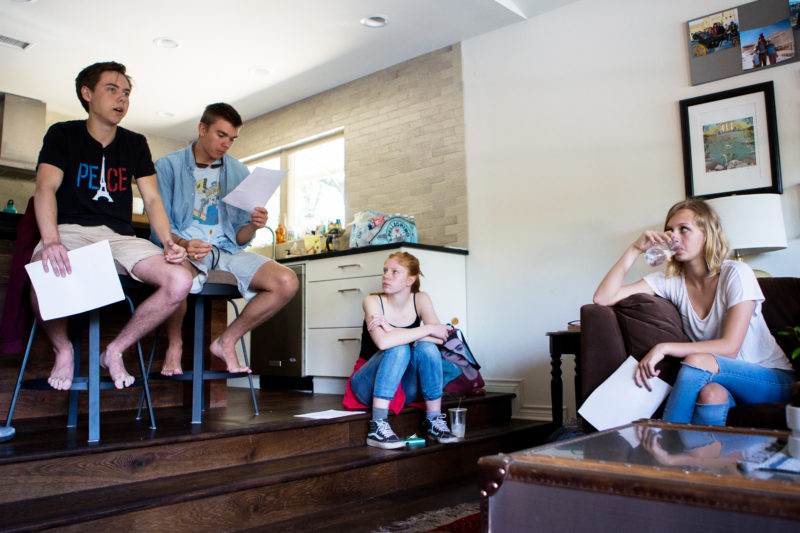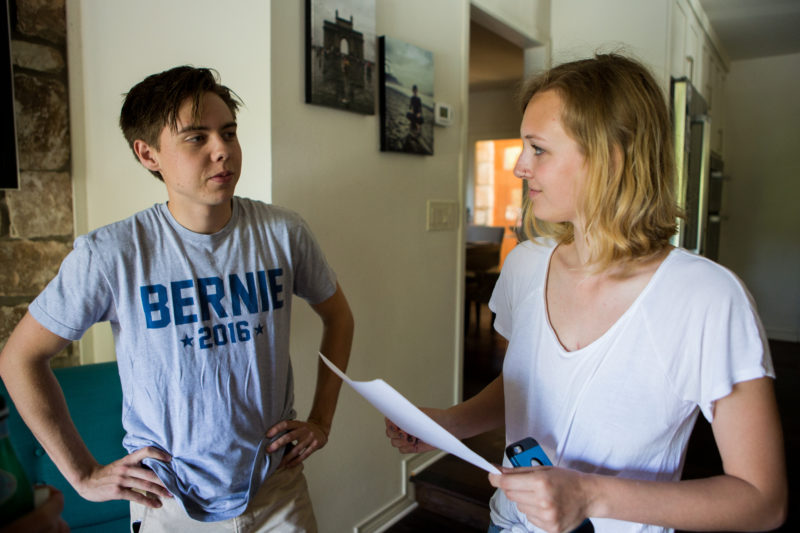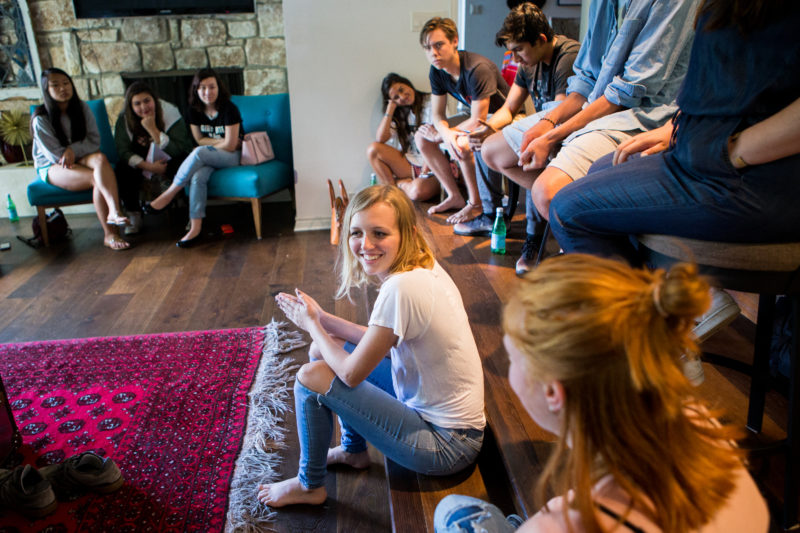They Can’t Vote Yet, but These Teens Are Plunging Into Politics
By Kathryn Lundstrom
Photography By Christian Benavides
Reporting Texas

Campbell Erickson, left, a cofounder of the One Future Action Network, leads a discussion at a recent meeting. Roxy Smith, right, was the other founder of a group of high schoolers who tackle political issues. Christian Benavides/Reporting Texas)
While most high school students spend their weekends playing videogames and sports, sleeping or studying for the SAT, a group of Austin-area teens has devoted two Sunday afternoons a month to educating themselves on current political issues.
Though the vast majority of the students who attend can’t yet vote, Westlake High School senior Campbell Erickson wants to use the group, called One Future Action Network, to inform those who will be voting in 2018 and 2020.
Erickson, 18, and his friend Roxy Smith, 16, a McCallum High School junior, got connected through social media after the election of Donald Trump.
“We were both really blown away by the election, as over half of America was,” Erickson said.
He and Smith met at Austin’s “One Resistance” rally on Inauguration Day and decided they needed to do something more to engage their peers on political issues.
“It became obvious to both of us that the terminology of it and some of [the political discourse] wasn’t clear to most people our age,” said Smith. “It’s important to educate people on what was happening and what they could do to stop it.”
Smith and Erickson aren’t the first teenagers to delve into political issues. Many people consider civil rights sit-ins of the 1960s as the beginning of youth activism in the U.S. The Chicano movement in the late 1960s and early ‘70s followed, including walkout by thousands of Hispanic middle and high school students in Texas and California to protest discrimination in schools.
The 2016 election may have created a similar wave of mobilization, according to Michael Young, a sociology professor at the University of Texas at Austin who studies political movements.
These days, social media recruitment makes the startup costs for activist groups much lower––the trick, according to Young, is keeping the momentum alive in a world of competing interests. “Even really, really important movements start in really, really small networks,” Young said.

Erickson and Smith, both high school students from the Austin area, discuss their agenda before a group meeting. Christian Benavides/Reporting Texas
Organizing and leading people isn’t new for Erickson, who’s headed to Harvard this fall to study government.
Before he and Smith started One Future, he’d already been involved with numerous other youth-led nonprofits and entrepreneurship programs such as TedX Youth Austin.
Erickson worked with Reilly Wieland, who’s also involved with One Future, on a nonprofit organization called “A Youth Mind,” which supports youth entrepreneurship in developing countries.
“Campbell has done more things in his 17 years than most people do in their entire lifetime,” said Tasha Banks, former programs manager at the Amala Foundation, where Erickson has participated in leadership and cultural exchange programs.
Erickson and Smith recently registered One Future with the Indivisible Project – a progressive network of local political advocacy groups with a mission to “defeat the Trump agenda.”
At each meeting, Erickson and Smith choose one topic to focus on. Since January, they’ve discussed health care, reproductive rights, climate change, and immigration. Based in Austin, at the heart of the “sanctuary cities” debate, they spent two meetings discussing immigration.
Seventeen students from five high schools attended last month’s meeting in Erickson’s spacious, incense-scented home. Perched on couches and stairs or lounging on the floor snacking on gluten-free brownies and candy, the teenagers discussed women’s health care and reproductive rights.
“Planned Parenthood is where I got like, all of my sex ed,” Smith said.
After sharing their experiences with women’s health care access, the group talked about what decreased funding for services like Planned Parenthood could mean for youth and low-income women. They then used a texting service called “ResistBot” to send faxes in support of Planned Parenthood from their smart phones to the office of U.S. Sen. Ted Cruz, a Texas Republican. They photographed themselves holding customized signs saying: “I stand with Planned Parenthood because…”

Smith wraps up the One Future meeting. Christian Benavides/Reporting Texas
One Future meetings generally attract about 15 people, with 40 the most yet. The group is open to “anyone who has an investment in the future of the nation,” Erickson said, emphasizing the group’s diversity. “We have people on free or reduced [price] lunches up to people who live in $5 million houses.”
“Our main concern is finding people to take over the group when we’re gone,” Smith said. Currently, they have a reach of over 140 young people through their social media networks, from seventh-graders to college graduates.
Because the energy of young people is so important to political movements, Young said, many of these youth movements get co-opted by institutional interests, such as larger, more established political organizations.
The fast-evolving nature of online and social media activism only increases the appeal of pulling youth movements into institutionalized political parties or nonprofits, who are “band-wagoning always on the new technology whereas the kids are pioneering it,” he said.
As they build their movement, Erickson and Smith hope to expand their leadership team and encourage young people across the country to start local chapters.
They also plan to build a website that breaks down political issues into a digestible format for young people, Smith said.
“The election was definitely not a good thing, but I think good things are coming out of it,” she said.